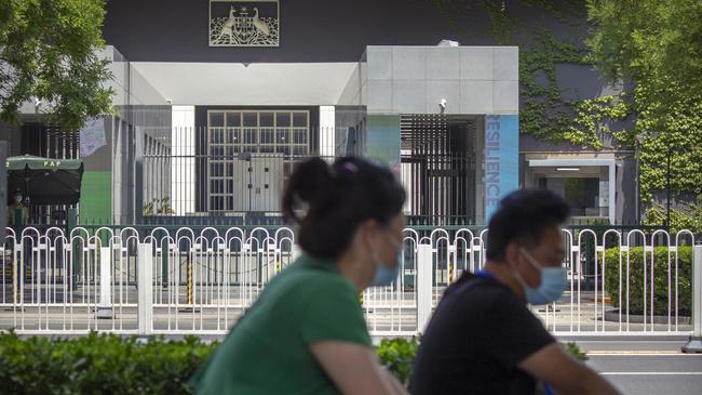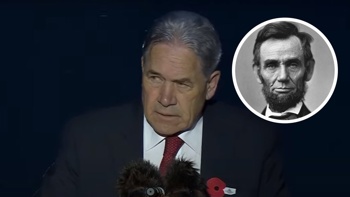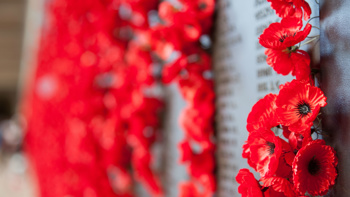Follow
the podcast on

China’s education ministry has warned Chinese students to consider whether to study in Australia, amid escalating tensions between Beijing and Canberra.
The Ministry warned that there have been multiple cases of racial incidents targeting Asians in Australia amid the COVID-19 epidemic.
“Multiple discriminatory events against Asians happened in Australia during the epidemic outbreak,” the Ministry said in a statement published to its website today.
It urged students studying overseas to make a thorough risk assessment and to be “cautious” when choosing Australia as a destination.
The warning follows the issuing of a travel warning to Australia for Chinese tourists on Friday.
A spokeswoman for China’s minister of culture, Hua Chunying, defended the call at a press conference yesterday, accusing Australian politicians of “ignoring rampant racist abuse”.
“For example, some Australian politicians and media called the coronavirus a ‘Chinese virus’ and maliciously tampered with the Chinese national flag and national emblem,” she is quoted as saying in government-controlled publication The Global Times.
“Many overseas Chinese in Australia have been verbally insulted or even attacked, (and) the property of some Chinese and other Asian families was destroyed and they suffered unfair treatment in their daily work.”
A University of Queensland student reportedly told The Global Times she received online and in-person abuse on campus recently.
“Anti-China news has been frequently seen on TV. We now choose to stay at home, and when I have to go outside and wear a mask, I avoid white people in case anything happens,” she said.
More than one third of all international university students in Australia come from China, with universities facing a shortfall of more than $12 billion in Chinese student fees if Beijing maintains its travel ban on Australia next year.
A spokeswoman for Australia’s Group of Eight – a coalition of the nation’s eight top-ranked universities – told 7 News while the China travel alert did not specifically refer to Chinese students coming to Australia, they were seeking further advice from the Chinese embassy.
“(We are) absolutely committed to our Chinese students and to maintaining a positive and collaborative relationship with China, and we look forward to being able to welcome them back to our campuses as soon as the health advice indicates that we can,” she said.
Last month, the Australian Human Rights Commission (AHRC) reported that one in four people who lodged racial discrimination complaints in the past two months were targeted because of COVID-19.
Yet Trade and Tourism Minister Simon Birmingham rejected the Chinese Ministry of Culture and Tourism’s travel alert in a statement on Friday, calling Australia “the most successful multicultural and migrant society in the world”.
“The Chinese Australian community is a significant and valued contributor to that success story,” he said.
“Millions of tourists from all corners of the world demonstrate their confidence in Australia as a safe, welcoming and amazing destination by visiting each year, often returning multiple times.
“We reject China’s assertions in this statement, which have no basis in fact. Our rejection of these claims, which have been falsely made by Chinese officials previously, is well known to them.”
UNIS RELY ON INTERNATIONAL STUDENTS
Australian universities have come to rely on international students as “cash cows” to keep the money flowing in and to boost their position on global university rankings.
Universities boosted their revenue by 6 per cent from $19 billion in 2008, to $32 billion in 2017 and about two-thirds of this was driven by increased international student fees.
About 10 per cent of all university students now come from China and this is worth an estimated $2 billion to Australian universities.
Chinese students attending university in Australian spend an of $27,000 in the space of about four months, contributing more than $10 billion to our economy.
The Centre of Independent Studies warned last year that the heavy reliance of some institutions on fees from overseas students, especially those from China, was a financial risk to the government and taxpayers.
A CIS report found the University of Sydney led the country in generating more than half a billion dollars in 2017 from Chinese student fees, making up about 23 per cent of its total $2 billion revenue.
“At these levels of exposure, even small percentage declines in Chinese student numbers could induce significant financial hardship,” the report suggested.
“Large percentage declines could be catastrophic. A 25 per cent fall in Chinese student enrolment would likely hit annual revenues (at 2017 levels) by more than $100 million at each of Sydney, UNSW, and (probably) Melbourne.”
The report said a 50 per cent fall in numbers, which could happen if the Chinese government imposed strict currency controls, would be a “billion-dollar revenue hit” across the seven institutions.
Executive Director at the Australian Strategic Policy Institute Peter Jennings told news.com.au we’ve allowed our economy to become too reliant on the one-party state.
“What’s clearly emerging now is that China does not behave like capitalist economies,” he said.
“We hoped it would behave like one when it went into the World Trade Organisation, but at its heart, we’ve got a one-party state that is prepared to use economic connections for political purposes.”
– With wires
Take your Radio, Podcasts and Music with you









